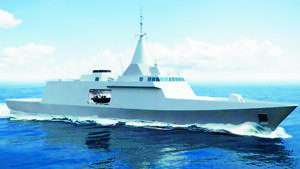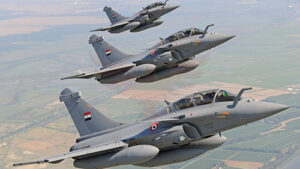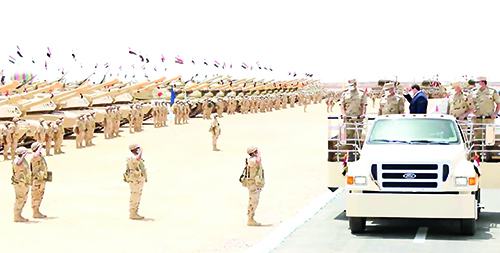In one of his public appearances, President Abdel Fattah El Sisi said he had been studying Egypt’s problems for decades, even before he became the country’s president. This probably applies most to the military and security challenges facing the Arab country.
The Egyptian leadership’s awareness of the problems and dangers facing this country were also probably behind the massive modernisation the nation’s armed forces had undergone in the past seven years, one amounting to a rebuilding of the army.
Egypt invested billions of dollars – even as it suffered tough economic conditions – between 2014 and 2021 to modernise its army and render it capable of meeting internal and external challenges.
The efforts of the past seven years in this regard amounted to what a military strategist once put it as an “internal revolution” in the Egyptian armed forces.

Major deals
Egypt hammered out deals for the purchase of a wide range of military equipment, including fighter jets, frigates, corvettes, tanks, helicopters and air defense systems from suppliers, including France, Russia, China, Italy, Germany and Spain, diversifying the sources of its arms and responding to its national security needs and growing unrest in the region.
The purchase of dozens of the French twin-engine Rafale fighter jets has sharpened the capacities of the Egyptian air force and made targets thousands of kilometres away from the Egyptian border within the reach of Egyptian wmilitary pilots, military analysts said.
“This also increases the comprehensive deterrence capabilities of the Egyptian armed forces and protect national interests,” retired army general Nasr Salim told a local news channel recently.
Arms procurement deals also included two helicopter carriers from France, submarines from Germany, helicopters from Russia, air defense systems from Russia and naval units from Italy.

Full control
The purchase of arms and equipment needed by all branches of the armed forces also coincided with the reformulation of troop distribution policies in line with national security dangers and needs for beefing up security nationwide.
The army command has constructed a series of new military, naval and air bases in different parts of Egypt, with the aim of responding to threats and protecting Egypt’s national interests in all strategic parts of this country.
Egypt has constructed major bases in the western desert, near the Suez Canal, on the Mediterranean and in southern Egypt, near the border with Sudan on the Red Sea.
Apart from increasing troop presence in these areas, the construction of these new bases also responded to threats to national security in different parts of Egypt, security analysts said.
“The new bases will function as logistical support points for army troops in the region,” Mohamed el-Kenani, an independent military researcher said. “They aim to protect Egypt’s security and economic interests,” a local newspaper quoted him as saying.
Internal changes
The procurement of arms and equipment and the construction of the new bases also moved hand in hand with changes taking within the armed forces, including through the introduction of new combat units.
A rapid intervention force was introduced in 2014. The force, which contains elite troops, acts to respond swiftly to threats to national security. They are highly armed and are able to reach targeted sites in a short time.
In January 2017, President Sisi also launched the Southern Naval Fleet which is now based in the Berenice Military/Naval base in southern Egypt on the Red Sea.
Information about changes taking place within armies does not usually go public, but these were a few of the changes introduced to the Egyptian armed forces in the past years in order to raise the capability of forces to deal with new threats to national security, military and security analysts said.

Growing threats
These changes coincided with the emergence of threats to national security both inside and outside Egypt. The growing menace of terrorism in Sinai, unrest in Egypt’s vicinity, especially in Libya, the turmoil in Yemen and the takeover of most of the country by the Iran-backed Houthi militia, and Egypt’s desire to protect its economic interests in the Mediterranean and the Red Sea, especially the country’s gas fields, made it necessary for Egypt to invest in its military
capabilities.
Sisi came to power in mid-2014 when a branch of the Islamic State group in Sinai was threatening security in North Sinai. It was also a time of unprecedented lawlessness and unrest as followers of toppled Islamist president Mohamed Morsi protested in the streets and Muslim Brotherhood-affiliated militias staging attacks against police stations, churches and state institutions.
The huge natural gas discoveries made in the Mediterranean as of 2015 and potential hydrocarbon reserves in the Red Sea also made it necessary for Egypt to modernise its navy and act to safeguard its coasts and territorial waters.
Unrest in neighbouring Libya, the entry into the country of thousands of foreign mercenaries, and the desire of some regional and international powers to control our western neighbour also made it necessary for Egypt to increase its military capabilities to prevent the rampant unrest in Libya from seeping into Egyptian territory, security analysts said.
Capability possession
President Sisi always highlights the importance of manufacturing goods, equipment and items for which Egypt used to depend on foreign suppliers.
The administration of the incumbent president applies this principle, especially when it comes to equipment needed by the army. In the past seven years, Egypt moved ahead with improving its military industries, expanding co-operation with international partners in this regard.
Naval industries facilities in Alexandria are utilising partnership with international manufacturers in expanding the manufacture of naval units, including frigates and corvettes.
Other army factories are also using partnerships and licenses from international arms makers in producing a long list of equipment locally, including armored vehicles, tanks, ammunitions, and air defence systems.
All these developments prove that Egypt is moving ahead on the road of defending its national interests and also becoming a formidable military power capable of bringing about the required balance to a region full of tensions.






Discussion about this post